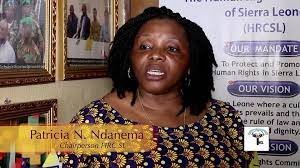By Amin Kef Sesay
Sierra Leone joined the rest of Africa on the 21st October, 2021 to commemorate African Human Rights Day. The Chairperson of the Human Rights Commission of Sierra Leone (HRCSL), Patricia Ndanema, in her statement highlighted that Africa Human Rights Day is commemorated every year on 21st October, a commemoration which marks the adoption in October 1981 of the African Charter on Human and Peoples Rights, which is the founding treaty of the African Human Rights System.
She pointed out that its coming into existence was a solemn undertaking by member States of the African Union to promote and safeguard freedom, justice, equality and fundamental human rights in the continent adding how the Africa Charter sets standards and establishes the groundwork for the promotion and protection of human rights in Africa.
According to her, since the adoption of the African Charter on Human and Peoples Rights 40 years ago, it has formed the basis for people to claim rights in a regional forum via the African Court of Human and Peoples Rights maintaining how it further emphasizes that human rights violations could no longer be swept under the carpet.
“This year’s event is celebrated under the theme: “Africa Human Rights 40 Years after the Adoption of the African Charter on Human and Peoples Rights”, she intimated.
She said Sierra Leone, as a State Party to the Charter, should use the theme for self-evaluation and subsequently use the occasion to raise human rights awareness, reflect and recommit to the solemn undertaking by the African leaders and African peoples to respect, promote and protect human rights in the country and the continent at large.
“The Human Rights Commission of Sierra Leone (HRCSL) as the national Institution mandated by HRCSL Act No. 9 of 2004 to promote and protect the human rights of all in Sierra Leone wishes to use this day to re-echo the obligation of all State Actors to apply rights-based approach in executing state functions and subsequently ensuring that the rights of citizens are protected,” she admonished stating that Sierra Leone has made many gains in improving the enjoyments of human rights since the end of the brutal civil war.
Based on what she stated many laws that are geared towards the protection of the rights of vulnerable and special groups such as women, children and persons with disabilities have been enacted; democratic independent institutions have been established; a lot of resources have been invested in the Police and Judicial systems; bad laws have be reviewed and quite recently H.E. the President Julius Maada Bio amongst others endorsed the Abolition of the Death Penalty by signing the Abolition of the Death Penalty Act, 2021 in fulfillment of several recommendations proffered at national, regional and international levels.
The HRCSL Chairperson reminds Government to fulfill its obligation under Article 62 of the African Charter on Human and Peoples Rights which stipulates that Each State Party shall undertake to submit every two years, from the date the present Charter comes into force, a report on the legislative or other measures taken with a view to give effect to the rights and freedoms recognized and guaranteed by the present Charter.
She said while the Commission acknowledges some of the existing economic, social, civil and political human rights challenges, let us unite in continuing with this trend of human rights development and build upon the gains made so far, as many yearn to see as per the Commission’s vision, “A Sierra Leone where a culture of human rights prevails and the people respect the rule of law and live in peace and dignity”.
The Human Rights Commission of Sierra Leone, according to her, therefore calls on Sierra Leoneans to take their human rights alongside with their responsibilities as good citizens clearly stated in Section 13 a -of the Sierra Leone Constitution, 1991 and also in Chapter 2, Articles 27-29 of the African Charter on Human and Peoples Rights.
She specially touched on Article 7, which encourages all Africans to preserve and strengthen positive African cultural values in relation with other members of the society, in the spirit of tolerance, dialogue and consultation and, in general, to contribute to the promotion of the moral wellbeing of society.
Patricia Ndanema expressed the view that the Commission will continue performing its statutory mandate by making investigations into incidents of human rights violations, monitoring detention areas, awareness raising and to use all available avenues to ensure the protection and promotion of rights and freedoms in the country.




